Stay in the know on all smart updates of your favorite topics.
Sustainable energy is the future. The city of Amsterdam has the ambition to provide every citizen with a solar panel in the next years. How do you contribute? Share your innovative initiatives on energy here.
Amsterdam and Haarlem launch groundbreaking sustainable artificial turf pitch innovations
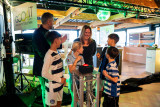
The pioneering innovations were presented of the Scale Up Future-proof artificial turf pitches project, a collaboration between Amsterdam and Haarlem focused on sustainable artificial turf pitches. Over the next few years, more than 250 sports pitches in both cities will be transformed into circular, energy-generating and climate-adaptive sports venues. These artificial turf pitches can not only generate and store energy, but also involve smart water management. An approach that is globally relevant for urban sports infrastructure.
Three consortia collaborate on the sport pitch of the future
The three selected consortia Antea Sport, EnergieVeld and GOO4iT together comprise more than 15 market players. They join forces within this innovation partnership, where there is room for long-term collaboration, co-creation and scalable innovation. The pioneering solutions will make it possible to cool down sport pitches on warm days, help dispose of and collect rainwater, make the pitches more pleasant for the users and possibly even generate energy for the surrounding area. Find out how these innovations are shaping the sport pitch of the future here.
Two municipalities: joint procurement
The Scale Up Future-proof artificial turf pitches project is a unique collaboration between two municipalities and market players. The municipalities jointly procure pooling their purchasing power and use an innovation partnership to challenge the market to test and scale up innovative and sustainable solutions. In doing so, the solutions are also scalable and transferable to other cities in the Netherlands and Europe.
From prototype to pilot fields
The first prototype fields will be constructed in Amsterdam and Haarlem in 2026, in different capacities and combining multiple innovations, where they will be extensively tested and monitored for a year. Successful concepts are then scaled up to full-scale pilot pitches and tested and monitored for another year. This will form the basis for the new standard of sustainable sports pitches, with potential for adoption in other cities around the world. At the same time, existing pitches are already being improved with the most sustainable solutions available, making an immediate impact from the start. The project thus shows how cooperation between municipalities and market players can lead to innovative, climate-proof sports infrastructure with international relevance.
Join us
This project provides cities worldwide a blueprint for sustainable, smart, and future-proof artificial turf pitches. Interested municipalities and industry partners can get in touch and subscribe to our news updates by sending an e-mail to: sportveldvandetoekomst@amsterdam.nl.
The Amsterdam Hunger Game

Learn with the case study Amsterdam to anticipate future food disruptions. Understand the city's food supply chain vulnerabilities is critical for enhancing food resilience. Enhance food resilience in empowerment of people in urban food growing.
Cenex Webinar #2 - EV Chargers: How to know where to place them?

Join us for an exclusive webinar featuring three leading European cities sharing their proven strategies for EV charging infrastructure placement. Learn from real-world experiences and discover data-driven approaches that are transforming urban mobility across Europe.
𝗪𝗵𝗮𝘁 𝗬𝗼𝘂'𝗹𝗹 𝗟𝗲𝗮𝗿𝗻
🏙️ 𝗦𝘁𝗿𝗮𝘁𝗲𝗴𝗶𝗰 𝗣𝗹𝗮𝗰𝗲𝗺𝗲𝗻𝘁 𝗔𝗽𝗽𝗿𝗼𝗮𝗰𝗵𝗲𝘀 - Discover how Brighton & Hove, Oslo, and Metropolitan Region of Amsterdam Electric have developed their EV charging strategies
📊 𝗗𝗮𝘁𝗮-𝗗𝗿𝗶𝘃𝗲𝗻 𝗗𝗲𝗰𝗶𝘀𝗶𝗼𝗻 𝗠𝗮𝗸𝗶𝗻𝗴 - Learn about the tools and methodologies these cities use to optimize charging point locations
🚗 𝗦𝗲𝗿𝘃𝗶𝗻𝗴 𝗔𝗹𝗹 𝗥𝗲𝘀𝗶𝗱𝗲𝗻𝘁𝘀 - Understand how to address the needs of residents without private parking spaces
🌍 𝗜𝗻𝘁𝗲𝗿𝗻𝗮𝘁𝗶𝗼𝗻𝗮𝗹 𝗕𝗲𝘀𝘁 𝗣𝗿𝗮𝗰𝘁𝗶𝗰𝗲𝘀 - Gain insights from three different countries and municipal perspectives
💡 𝗟𝗲𝘀𝘀𝗼𝗻𝘀 𝗟𝗲𝗮𝗿𝗻𝗲𝗱 - Avoid common pitfalls and learn from real implementation experiences
𝗙𝗲𝗮𝘁𝘂𝗿𝗲𝗱 𝗦𝗽𝗲𝗮𝗸𝗲𝗿𝘀
Kieran Fitsall - Brighton & Hove Council
Sture Portvik & Sara Teige Kalsaas - City of Oslo
Annekee de Jager - MRA-e (Amsterdam Metropolitan Region)
Hosted by Sanne van Breukelen - Cenex Nederland
𝗪𝗵𝘆 𝗔𝘁𝘁𝗲𝗻𝗱?
With Europe requiring 6.8 million public charging points by 2030, municipalities face unprecedented challenges in planning and implementing EV infrastructure. This webinar brings together three cities that have successfully navigated these challenges, offering practical insights for:
- Municipal planning departments
- Urban mobility professionals
- EV infrastructure developers
- Policy makers and city officials
- Transport consultants
𝗞𝗲𝘆 𝗧𝗼𝗽𝗶𝗰𝘀 𝗖𝗼𝘃𝗲𝗿𝗲𝗱
- Historical approaches vs. modern data-driven strategies
- Stakeholder engagement
- Grid capacity considerations and smart charging integration
- On-street charging solutions for urban residents
𝗪𝗵𝗼 𝗦𝗵𝗼𝘂𝗹𝗱 𝗔𝘁𝘁𝗲𝗻𝗱
This webinar is essential for anyone involved in:
- Urban planning and development
- Sustainable transport initiatives
- EV infrastructure deployment
- Municipal policy development
- European mobility strategy
𝗥𝗲𝗴𝗶𝘀𝘁𝗿𝗮𝘁𝗶𝗼𝗻
Don't miss this opportunity to learn from Europe's leading cities in EV infrastructure planning. Register now to secure your spot and gain access to exclusive insights that could transform your city's approach to EV charging.
---
This webinar is part of Cenex's ongoing commitment to accelerating the transition to sustainable transport through knowledge sharing and best practice dissemination across European cities.
Demoday #28: How to keep our mechanics on the move?
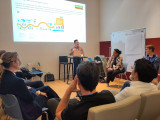
On the 5th of July, during Demoday #28, we zoomed in on one of the pressing challenges facing the energy transition: grid congestion, and more specifically, how to keep the people who maintain the grid moving efficiently.
Grid congestion is a serious and growing concern for grid operator Alliander. It is therefore essential to speed up the grid reinforcement as much as possible. Alliander’s Operation 2.0 team is exploring innovative ways to work smarter, faster, and more flexibly to keep pace with these developments.
Their efforts focus on three tracks:
• Alleviating staff shortages by training office employees to occasionally support fieldwork.
• Exploring technologies like advanced ground radar to get better insights into underground assets.
• Improving the logistics of supplying mechanics to ensure they have the right tools, in the right place, at the right time.
This last track was the main focus of our work session.
Inefficient supply of mechanics
Logistics experiences show that mechanics collect materials inefficiently when supplying their vans and jobs, resulting in stock corrections, less control over stock, unnecessary work for logistics staff, and valuable mechanic hours being lost, which leads to less execution work. A few key problems stood out:
• Supplies are scanned inconsistently, so the system doesn’t reflect what is actually in stock.
• Every van is different, with a custom layout that suits the preferences of its mechanic.
• The work itself is unpredictable, which makes standardised restocking difficult.
• With a transition to smaller electric vans, space is becoming even more limited.
A simple optimisation of the process is not enough, especially without considering the human element. For many mechanics, a visit to the supply centre is more than just logistics. It is a moment of connection, a short break from the road, or simply a chance for a good coffee.
Ideas from the network
In groups of four, we brainstormed creative ideas to improve the supply of Alliander vans while keeping the needs and routines of mechanics in mind.
Some highlights:
• Peer-to-peer van inspiration: Let mechanics share the layout of their vans with colleagues. They can exchange best practices and take pride in an efficient setup. Adding a bit of gamification might boost motivation even more.
• A mobile supply service: A supply van could drive around to restock mechanic vans, reducing the need to visit the supply centre. However, this might remove the social element of taking a break with colleagues.
• Smarter routing: Track the location of mechanics only in relation to nearby grid faults. This way, the closest available mechanic can respond without feeling like their movements are constantly being monitored.
• Package-based resupply: Inspired by delivery service Picnic, mechanics could exchange complete “supply packages” instead of picking out materials individually. Collaborating with wholesale suppliers could reveal more useful insights.
• Automatic stock tracking: Tag all materials with RFID chips and use sensors installed in the door of the van to register what is removed from the van. This eliminates the need for manual scanning and reduces the chance of mistakes.
Do you have a bright idea to improve how mechanics work? Let us know in the comments or send a message to Noor at noor@amsterdaminchange.com.
A big thank you to Thomas Hoekstra and Iris van der Zanden from Alliander for bringing this challenge to the network, and to Chantal Inia from Royal HaskoningDHV for moderating the session.
Waag Open: Electric Garden

In de hoop dat technologie ons uit de klimaatcrisis redt, worden er miljoenen geïnvesteerd in technologieën op het gebied van kunstmatige intelligentie. Tegelijkertijd genereert de hele IT-industrie nu al 900 Megaton aan CO2 per jaar. Dat is zeven keer zoveel als de uitstoot van heel Nederland in 2023. Technologische innovatie en een gezond ecosysteem lijken niet samen te gaan. Kunnen technologie en natuur samenwerken bij het redden van onze planeet?
Kunstenaar Sunjoo Lee experimenteert in haar project ‘Electric Garden’ met een elektriciteitsproducerende tuin. Zolang het ecosysteem in haar tuin bloeit, kan elektriciteit worden opgewekt. Tijdens deze Waag Open in juli maken we een eigen Electric Garden in de Waag. In een boeiende workshop neemt Sunjoo je mee in de wereld van regeneratieve technologie en leer je hoe de natuur als duurzame energiebron kan fungeren.
Programma
| 19:15 - 19:30 uur | Inloop |
|---|---|
| 19:30 - 19:45 uur | Welkom & introductie |
| 19:45 - 21:30 uur | Workshop Electric Garden |
Over Electric Garden
Electric Garden verkent op creatieve wijze de mogelijke samenwerking tussen natuurlijke ecosystemen en digitale systemen. De tuin produceert elektriciteit via het metabolisme van anaerobe bacteriën die in natte grond leven, met behulp van een technologie die Microbial Fuel Cells wordt genoemd. Elke container werkt als een batterij en is uitgerust met elektroden die de elektronen oogsten die door de bacteriën worden uitgezonden. De planten en insecten in de tuin voeden de bacteriën. Zolang het ecosysteem bloeit, kan elektriciteit worden opgewekt.
Over Sunjoo Lee
Sunjoo Lee is een interdisciplinair kunstenaar. Haar werk bevindt zich op het snijvlak van kunst, technologie en ecologie. Ze is gevestigd in Nederland en Zuid-Korea en is gefascineerd door het gebruik van elektronica en digitale hulpmiddelen die het menselijk belang overstijgen. In haar werk verkent ze onderwerpen als meer dan menselijke filosofie, emergentie, biomimicry, toekomstige vormen van symbiose en permacomputing.
Waag Open
Elke eerste donderdagavond van de maand opent Waag haar deuren! Kom langs om te discussiëren en te doen. Want we gaan niet alleen in discussie over maatschappelijke thema's en de toekomst – je leert daarnaast ook altijd iets praktisch. Iets dat je altijd al hebt willen uitproberen, zoals de 3D-printer in het FabLab, of juist iets dat je nooit had verwacht, zoals uitpluizen hoe DNA in elkaar zit in ons biotech-lab. Waag Open vindt plaats in de maakplaatsen op de eerste en tweede verdieping van het historische Waaggebouw op de Nieuwmarkt.
Toegankelijkheid
Mocht je krap bij kas zitten en wel graag aan dit evenement willen deelnemen, neem dan contact op met sanna [@] waag [punt] org.
A Lab Open Huis. Met exposities, pitches voor een positieve toekomst, live muziek, dans en theater, workshops en meer!

Laat je nieuwsgierigheid de vrije loop tijdens het <strong>A Lab Open Huis</strong>. Een creatief en innovatief festival voor alle nieuwsgierige Amsterdammers die in deze turbulente tijden waarde hechten aan kunst & cultuur, duurzaamheid en sociale innovatie.
Kom kijken hoe meer dan 350 members in onze broedplaats werken aan een positieve toekomst. Met een programma vol exposities, live muziek, kunst, pitches, theater, fotoreportages, workshops, interessante ontmoetingen en meer! Kinderen? Neem ze vooral mee, het is voor iedereen een feestje!
Ontdek nieuwe ideeën, ontmoet makers en verken het live programma. Dwaal rond en laat je verrassen door wat je tegenkomt, of volg een van de inspirerende routes die speciaal zijn samengesteld langs de thema’s waar A Lab members aan werken. Er is een (digitale) kunst & cultuurroute, een duurzaamheidsroute, een sociaal maatschappelijke innovatieroute en ga voor een mix van activiteiten in de kidsroute.
Bekijk het volledige programma met timetables komende tijd op de website, maar een sneak peek is natuurlijk altijd leuk. Laat je meevoeren door livemuziek – van opkomend raptalent tot jazzy klanken – en ontdek unieke ervaringen zoals een levende algenexpo, verticale dans op de binnentuinmuur en interactieve datavisualisatie. Luister naar korte, inspirerende talks over een zelfredzame toekomst, stap in een Kanta vol verhalen over Amsterdam Noord, of scoor iets moois in de A Lab pop-up store. Geniet van wereldse smaken van de restaurants van het nieuwe Maritim Hotel, bewonder kunst van o.a. jonge makers, draai aan een meteorologisch rad of ga zelf aan de slag in een escape room of met je eigen digitale kunst. En voor filmliefhebbers: struin door Izzy’s Videotheek voor verborgen parels die je nergens kunt streamen.
Het event is gratis, maar reserveer wel je gratis ticket via deze link.
Amsterdam Data Design Den- Beyond the Graph
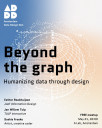
Amsterdam Data Design Den is the city's newest community meetup celebrating the intersection of data, design, and storytelling. In an era where information surrounds us, we believe in the power of creative visualization to transform complex data into compelling narratives that inspire and inform.
Every couple of months, we bring together professional designers, creative studios, and emerging talents in an informal setting to share groundbreaking projects and foster meaningful connections. Our speakers range from established design studios showcasing large-scale data visualization projects to independent designers experimenting with novel approaches to information design.
What makes our meetup unique is its commitment to accessibility and community. There's no entry fee, no membership requirements—just a gathering of curious minds passionate about using design to make sense of our data-driven world. Whether you're a seasoned information designer, a student exploring data visualization, or simply intrigued by the creative possibilities of data storytelling, you'll find your place here.
Join us for an evening of inspiration, networking, and casual conversations over drinks. Each session features thought-provoking presentations followed by open discussions, creating an environment where ideas flow freely and collaborations naturally emerge.
Amsterdam Data Design Den meets in the heart of Amsterdam, bringing together the city's vibrant creative community to explore the future of data visualization and information design.
Enabling the Future with High Tech

Societal challenges such as climate change, geopolitical security issues, and an ageing population are widely recognised. However, the fact that photonic, nano, and quantum technology can provide solutions to these global problems remains largely unknown to many.
Addressing these major dilemmas requires an approach in which technology plays a central role. Key enabling technologies in general – and photonics, nano, and quantum technology in particular – are therefore in the spotlight when it comes to the strategic plans of businesses and governments.
These technologies enable, for instance, secure communication, the development of smarter and more cost-effective sensors, and the creation of highly targeted medicines.
Who is it for?
This symposium is intended for professionals working in industry, public institutions, and knowledge organisations. Potential attendees include:
🔹 Scientists and researchers – Academics and researchers in physics, electrical engineering, materials science, and nanotechnology
🔹 Engineers and technologists – Professionals working on optical systems, semiconductors, quantum computing, and nanotechnology
🔹 Students and PhD candidates – Master's and PhD students in physics, computer science, and engineering
🔹 Industry experts and entrepreneurs – Companies and startups in high-tech sectors such as photonics, quantum computing, telecoms, and sensor technology
🔹 Government and policymakers – Organisations driving innovation, such as ministries, EU programmes, and investment funds
🔹 Investors and venture capitalists – Investors interested in deep-tech startups and the commercial applications of these technologies
Sign up right now - admission is free!
Underground Challenges and Shared Solutions: Lessons from Amsterdam for District Heating in Haarlemmermeer
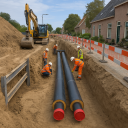
How do you install district heating in villages with narrow streets and limited underground space? This was the central question during a recent deepdive session hosted in the municipality of Haarlemmermeer. The session brought together experts from the City of Amsterdam, local officials and experts from Haarlemmermeer, and Arcadis to explore practical solutions to the physical challenges of implementing district heating in dense and complex infrastructure environments.
From complexity to coordination
Amsterdam has years of experience addressing similar challenges in dense urban areas where underground infrastructure is already under pressure. Experts from the City of Amsterdam were invited to share their approach, which combines long-term planning, integrated design processes, and flexibility in applying standards.
Some key principles they shared:
- Planning 15 years ahead: Amsterdam actively involves all utility providers to map out future plans and co-create underground infrastructure layouts.
- Using standard ways of working in the underground (WIOR) and a standardised scheme for subsurface infrastructure planning: These frameworks help assess available underground space and guide decisions when concessions are necessary.
- Embracing alternative methods: Stacking pipelines instead of placing them side-by-side, drilling under roads, or clustering transport cables in walls or consolidated zones are all viable options.
Sometimes, this requires deviating from standard spacing requirements. Such exceptions are only made with strong justification and agreement at the decision-making level.
A fresh look at Haarlemmermeer’s challenges
Participants from Haarlemmermeer acknowledged that they face several pressing issues. With limited space in the underground and a lack of an integrated planning framework, it is difficult to make informed, long-term decisions. Three villages in the municipality are particularly challenging due to their narrow streets and aging infrastructure.
Key challenges included:
- Underestimating the space needed for district heating infrastructure (including expansion loops, communication lines, and insulation).
- Rigid adherence to guidelines, which may not always be feasible locally.
- A missing coordinating role to oversee all the different parties operating in the underground to facilitate collaboration.
Shared lessons, shared responsibility
The session made clear that while every context is different, the challenges of underground infrastructure for district heating are shared across municipalities. The city of Amsterdam is a bit further ahead than Haarlemmermeer, and their expertise was already tremendously helpful. The Amsterdam case shows that smart, flexible planning—backed by clear coordination of all parties active in the underground —can lead to effective, long-term solutions.
Now the task for Haarlemmermeer is to translate these insights into concrete next steps. As one participant concluded, “We need to move from awareness to action.”
Would you like to learn more about this topic? Please contact Noor at noor@amsterdaminchange.com.
PhD translation: Capturing change in the energy transition and beyond (with Tessa de Geus)
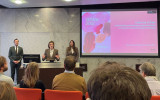
(this event is in Dutch)
De actie-onderzoekers van DRIFT werken jarenlang aan hun proefschrift en ontwikkelen daarmee state-of-the-art kennis en tools. Traditioneel gezien wordt deze kennis echter alleen ontsloten in boekvorm en overgedragen aan hun commissie van (hoog)leraren. Daarom organiseren we naast een PhD-verdediging een PhD-vertaling.
Op 11 april is de beurt aan Tessa de Geus. We duiken in haar proefschrift ‘Capturing change’ (<em>verandering vatten).</em> Het onderwerp: verschillende vormen van ‘capture’ in de energietransitie – krijgen radicale nieuwe initiatieven of ideeën de wind eronder zodra ze zich op een groter speelveld begeven of raken ze vleugellam?
Hoewel de term buiten de transitiewetenschap (nog) niet zo bekend is, is ‘capture’ een heet hangijzer voor wie werkt aan fundamentele maatschappelijke verandering. Denk aan een overheid die een burgerinitiatief ondersteunt of eigen innovatieve praktijken opschaalt – in grote veranderingsprocessen als de energietransitie is veel hoop gevestigd op zulke nieuwe bestuursvormen, maar is weinig bekend over de schaduwzijde ervan, stelt Tessa.
Net als bij de PhD-verdediging beginnen we met een ‘lekenpraatje’ — Tessa legt in begrijpelijke taal uit wat ze heeft onderzocht en welke conclusies en aanbevelingen daaruit volgen.
Daarna openen we het gesprek. Onze drie panelleden stellen zich kort voor en dan gaan met de promovendus in gesprek over vragen als: wat betekenen jouw uitkomsten voor mijn beleid, bedrijf of activisme? Wat herken ik en wat zie ik toch anders? En hoe zouden we opgedane lessen en methodes kunnen toepassen in ons (werk)veld?
Op 11 april kun je van 10:00-11:00 via YouTube live meekijken met dit evenement. Meer informatie vind je op onze website:
Demoday 27# District heating and resident participation in the municipality of Haarlemmermeer
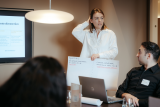
The municipality of Haarlemmermeer is actively working on the realisation of the energy transition in the municipality by, among other things, focusing on sustainable heat supplies. As part of this, a heat initiative has been started in the village of Rijsenhout (east of Haarlemmermeer). This initiative has not been taken up by the market in the past. This has led the municipality to want to take a more active role in the development of District heating in which resident participation is a crucial factor.
During the Knowledge- and Demodag on 13th of March (2025), Kelly Winters and Sophie Keijzer (Hieroo) led a session with the participants that looked at similar successful processes in the past of realising a heat network. The central questions were: What was the success and why was it a success?
Session structure and focus
During the session, the participants split into two groups. Similar processes were then discussed in the two groups in which the success factors of the realisation of energy transition projects were examined. An important example that was discussed in the session was the Schoonschip project in Amsterdam North. This project is a sustainable initiative in which residents have researched how they can live on the water in a circular and sustainable way. This resulted in a community of 46 houseboats that share energy with each other via a Smart Grid that’s cheaper and more efficient.
Outcomes and insights
During the session, various strategies were discussed to strengthen resident participation and make heat network initiatives successful. The most important points from the discussions are:
1. Composition of the initiator group: A diverse and enthusiastic group is crucial. In the Schoonschip project, the core of the success was a group of pioneers who complemented each other in creativity and expertise. Such a group can also be formed in Rijsenhout if they are properly guided and supported.
2. The role of the municipality: The municipality must be aware of the distrust that residents often have towards government institutions. Using an external intermediary or an independent entity can help to reduce this mistrust.
3. Reward and inspire: One way to involve residents in a low-interest topic such as energy is to reward them. Examples are setting up competitions, the use of ambassadors or energy coaches and the organisation of events. Linking opportunities, for example by combining energy transition with social goals such as combating energy poverty, can also play an important role.
4. Using the right moment: An important lesson from the Schoonschip project is to use external circumstances to arouse interest. A crisis, such as rising energy costs or limited energy production, can turn a low interest topic into a high interest topic for people.
5. Governance and structure: A solid Governance structure is essential. The municipality can play a role as a project manager by setting clear deadlines and formulating requirements. This helps both initiators and residents to keep focus and take steps towards concrete results.
Follow up
Do you have a tip to help the municipality of Haarlemmermeer with their district heating plans? Or do you have a question about this project? Contact Ouassim at Ouassim@amsterdaminchange.com or Noor at Noor@amsterdaminchange.com. Later this week on 27th of march, we'll dive into the technical problems that district heating poses, when there just isn't enough space in the underground to build it. If you would like to know more about this, let us know.
Cenex Nederland Lenteborrel 2025 - 8 mei

🌿 Vier de lente met ons tijdens de Cenex Nederland Lenteborrel 2025! 🌸
[English below]
Op 8 mei 2025 organiseren we weer een nieuwe editie van de Cenex Lenteborrel! Dit jaar is de editie open voor iedereen, het wordt een inspirerende middag vol innovatie, samenwerking en netwerkmogelijkheden.
📍 Locatie: A-lab, Overhoeksplein 2, 1031 KS Amsterdam
🕒 Tijd: 13:30 - 18:30
✨ Wat kun je verwachten?
🔹 13:30 - 15:30 – Inloop & exposanten
Ontmoet onze exposanten en ontdek de nieuwste innovaties op het gebied van mobiliteit en circulariteit.
🔹 13:30 - 15:00 – Twee serious games
Doe mee aan een interactieve sessie en verken de uitdagingen en kansen in de sector op een speelse manier. Liever toeschouwer? Dat kan ook! (Kies één sessie)
🔹 15:30 - 16:45 – Vijf inspirerende keynotes (Engels)
We verwelkomen sprekers van onder andere:
⚡ Coding the Curbs
⚡ Kempower
⚡ Ministerie van Infrastructuur en Waterstaat
⚡ Circular Campus
⚡ Cenex Nederland
🔹 16:45 - 18:30 – Gezellige Lenteborrel
Sluit de dag af met een hapje en een drankje, terwijl je nieuwe connecties legt met andere professionals.
Houd onze Eventbrite-pagina en LinkedIn in de gaten voor updates over sprekers en exposanten!
📢 Bevestig je aanwezigheid en mis het niet! (Beperkt aantal tickets beschikbaar)
Registreer hier: https://cenex-lenteborrel-2025.eventbrite.nl
-------English
🌿 Join us for the Cenex Spring Reception 2025! 🌸
On May 8, 2025, we’re hosting the latest edition of the Cenex Lenteborrel (Spring Drinks)—and this year, it’s open to all! Expect an inspiring and engaging afternoon filled with innovation, collaboration, and networking.
📍 Location: A-lab, Overhoeksplein 2, 1031 KS Amsterdam
🕒 Time: 13:30 - 18:30
✨ What’s in store?
🔹 13:30 - 15:30 – Walk-in & exhibitor showcase
Meet our exhibitors and explore the latest advancements in mobility and circularity.
🔹 13:30 - 15:00 – Two serious games
Join an interactive session tackling industry challenges in a fun, engaging way. Prefer to observe? That’s possible too! (Choose one session.)
🔹 15:30 - 16:45 – Five inspiring keynotes (English)
Industry leaders will share their insights, including:
⚡ Coding the Curbs
⚡ Kempower
⚡ Ministry of Infrastructure and Water Management
⚡ Circular Campus Delft
⚡ Cenex Netherlands
🔹 16:45 - 18:30 – Spring Networking Reception
Wrap up the day with drinks, bites, and great conversations with fellow professionals.
Stay tuned via our Eventbrite page and LinkedIn for speaker and exhibitor updates!
📢 Confirm your attendance and don’t miss out! (Limited tickets available)
Register here: https://cenex-lenteborrel-2025.eventbrite.nl
Innovation Dinner - Cultuurverandering in de bouw
Op woensdag 26 maart organiseren BouwLab R&Do en 3D Makers Zone vanuit het programma van de EDIH het Innovation Dinner Cultuurverandering in de bouw.
De bouwsector staat op een keerpunt. Jarenlang werd er traditioneel en lineair gewerkt, maar de uitdagingen van vandaag - verduurzaming, digitalisering en circulariteit - vragen om een fundamentele transformatie. Wie niet meebeweegt, blijft achter.
Tijdens deze avond gaan we dieper in op de volgende thema's:
- Van afval naar waarde - Hoe maken we circulair bouwen de norm? Jaarlijks produceert de Nederlandse bouwsector meer dan 20 miljoen ton afval! In een wereld waar grondstoffen schaars worden, is dat onhoudbaar. Innovatieve bedrijven laten zien dat het anders kan. Gebouwen worden gesloopt met een materialenpaspoort, zodat onderdelen een tweede leven krijgen. Prefab houtbouw vervangt traditionele bouw, waardoor woningen sneller, lichter en met een lagere CO2-uitstoot gerealiseerd kunnen worden.
- Digitalisering als versneller - Hoe benutten we AI, digital twins en data? Ook digitalisering speelt een cruciale rol in de modernisering van de bouw. Digital twins, AI en big data kunnen bouwprocessen optimaliseren, terwijl drones en 3D-scans de veiligheid en nauwkeurigheid vergroten.
- <strong>Samenwerken of stagneren?</strong> - Hoe doorbreken we silo's en creëren we ketensamenwerking? Verandering komt alleen tot stand als bedrijven over hun eigen schaduw heen stappen. Ketensamenwerking, waarin partijen niet alleen contractueel maar ook inhoudelijk verantwoordelijkheid delen, is noodzakelijk voor circulariteit en digitalisering. Dat verlangt nieuwe verdienmodellen, waarbij niet alleen de laagste prijs maar de waarde op lange termijn centraal staat.
- Van traditie naar toekomst - Hoe breken we met oude patronen?
Eindconferentie: LIFE Arenapoort project (netcongestie)
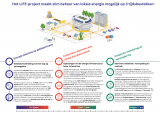
Met het LIFE project in Amsterdam Zuidoost zijn we bezig met een eindconferentie te organiseren op 4 maart middag (13u-17.30) bij de Johan Cruijff Arena en je bent uiteraard van harte welkom (net als je collega's)!
Hieronder de aanmeld pagina met de programma:
[https://www.eventbrite.nl/e/tickets-eindconferentie-life-project-1206732572609](https://www.eventbrite.nl/e/tickets-eindconferentie-life-project-1206732572609 "https://www.eventbrite.nl/e/tickets-eindconferentie-life-project-1206732572609")
Het conferentie gaat over de bijdrage van het LIFE project om innovaties te realiseren om netcongestie te beheren op gebiedsniveau, <strong>in samenwerking met Alliander, Johan Cruijff Arena, Gemeente Amsterdam, TU Delft, Spectral, AMS Institute en andere tech en kennis partners</strong>. Er komen ook inspirerende keynote sprekers om de context te laten zien waarin het project opereert:
- Bart van der Laan, Programmamanager Flexibel Energiegebruik, Alliander
- Ellen Nieuwboer, Projectdirectuer gebiedsontwikkeling, Gemeente Amsterdam
- Roland Lazet (ING) & Andro Bottse (Green Business Club Zuidoost), EnergyHub Arenapoort Taskforce
Samen kijken we naar hoe de onderzoek en tools van LIFE wordt toegepast in Amsterdam Zuidoost om netcongestie op een inclusief en collectief manier te kunnen beheren.
Tot 4 maart bij de Arena!
Project Team LIFE
Artikel 'Eigen opwek voor de buurt - Slim omgaan met het bestaande net'

Hugo Niesing, directeur van Resourcefully, werd geïnterviewd in het decembernummer 2024 van het gemeentelijk magazine van Amsterdam over innovatieve oplossingen voor de integratie van mobiliteit, energie en netcongestie. Het artikel laat zien hoe projecten zoals de pilot in Sporenburg in het Oostelijk Havengebied bijdragen aan een duurzaam en toekomstbestendig lokaal energiesysteem. Hier werken we met 500 huishoudens om piekuren te verminderen en lokaal opgewekte energie optimaal te benutten.
Lees hier meer over dit inspirerende initiatief via de link.
Innovation Dinner Digitale Fitheid

Vanuit het programma van de EDIH Digital Hub Noordwest organiseren BouwLab R&Do en 3D Makers Zone weer een Innovation Dinner.
In een wereld waar we allemaal werken met een scherm, is het belangrijk om stil te staan bij ‘hoe’ we daarmee werken. Hoe verwerken we informatie? Hoe slaan we informatie op? Hoe voorkomen we een overload aan mails en data? En hoe zorgen we ervoor dat we efficiënt blijven in een steeds digitaler landschap?
Om organisaties en hun medewerkers hierin te ondersteunen, heeft de overheid samen met verschillende partners de Maand van de Digitale Fitheid gelanceerd. Deze jaarlijkse campagne in maart richt zich op de digitale vaardigheden van de 4 miljoen keniswerkers in Nederland.
Samen met Martijn Aslander, een van de initiatiefnemers van deze campagne en auteur van onder andere ‘Ons werk is Stuk’, nemen we je mee in de wereld van digitale fitheid en de vijf essentiële pijlers:
- Digitaal bewustzijn
- Digitale Hygiëne
- Digitale vaardigheden
- Persoonlijk kennismanagement
- Persoonlijke groei met hulp van technologie
Last spots available for "Prototype for Change" project. Pitching your digital challenge february 4 and receive a prototype of a new website in june 2025 by talented, datadriven students UvA!
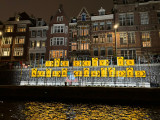
Do you work on innovative new ideas and are in for a project where talented students develop digital prototypes of websites aiming for Change? Do you want work with students from the most innovative datascience programme of the University of Amsterdam? Please reach out to me and drop me an email at: s.a.hansen@uva.nl or call me.
Students Computational Social Science are tasked with designing a website aimed at driving behavioral change in the contexts of climate change, surveillance, renewable energy, Circular economy or health. The project involves iterative prototyping and testing phases, which include conducting focus groups and experiments to refine users’ experience and impact.
The final deliverables include:
- A website (in python)
- A written report, investing divergent stakeholder perspectives and emphasizing effective opportunities for digital interventions
Students will also prepare and deliver a presentation of the study’s major findings to the partner, stakeholders, and their peers.
In 16 weeks from a challenge and idea into a prototype.
The only commitment we ask is your time, for at least 1 hour a week.
Please let us know if you have interesting project ideas!
greetings, Suzanne Hansen, head of partnerships Computational Social Science
M: 06- 482 72 193 | s.a.hansen@uva.nl
--
De opleiding Computational Social Science, is een innovatieve datascience opleiding van de UvA gericht op de publieke sector. Onze internationale en gepassioneerde studenten werken 2x per jaar, in februari en september in teams aan digitale producten zoals websites, data analyses, infographics en meer.
Wat wij zoeken zijn ambitieuze opdrachtgevers en innovators, die 1 uur per week willen investeren en boeiende challenges kunnen aandragen gericht op gedragsverandering en systeemverandering.
Bel gerust als je meer informatie wilt. Mijn nummer is 06- 482 72 193 en mail is s.a.hansen@uva.nl
Onze studenten werken op de Roeterseiland campus in Adam Oost, waar we voor onze partners ook een fijne werkplek kunnen bieden op de momenten dat zij online of fysiek studenten coachen en inspireren.
Zero Emission Urban Logistics Challenge
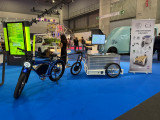
From January 1 2025, a zero-emission zone will be introduced in the centre of Amsterdam, with the aim of improving air quality and making the city healthier and more liveable. This policy helps achieve climate goals and supports the ambition of becoming climate neutral by 2050. It encourages zero-emission urban logistics, which contributes to reduced pollution, noise, and traffic congestion. And cleaner air also has positive effects on the health and well-being of residents. With this initiative, Amsterdam - and other Dutch cities implementing such zones this year - aim to set an example for other cities and stimulate innovation in sustainable mobility. The so-called "zero-emission zone" is therefore an essential measure in the transition to a cleaner and more sustainable city.
This transition will only succeed through collaboration. Therefore, considerable attention is being paid to the experiences and needs of small business owners in the city. Think of; market vendors, house painters, and local greengrocers. What kind of support do they need to transition to zero-emission vehicles, and how do entrepreneurs creatively adapt to the transition and new rules? Other cities and municipalities are closely observing and there is a strong need for knowledge sharing. It is important that the experiences and lessons learned from Amsterdam, as one of the pioneers, are well-documented and shared on a national and international scale.
Smart City Expo World Congress | Barcelona 2024 | Personal highlights
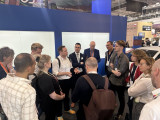
In early November, I travelled to Barcelona for the third time to attend the Smart City Expo World Congress. Together with the Amsterdam InChange Team, some of our network partners, and the Dutch delegation, we put together a strong content-focused programme, gained inspiration, and strengthened both international and national connections. In this article, I’ll briefly share some of my personal highlights from this trip.
International Delegations: Building International Connections and Knowledge Exchange at the Expo
During the congress, I organised several guided visits from the Dutch Pavilion in collaboration with the DMI-Ecosystem. The aim of these visits was to connect the Dutch delegation with international colleagues and facilitate knowledge exchange. At the busy expo, full of companies, cities, regions, and conference stages, it’s really appreciated to join planned meetings on specific themes. It’s also a great chance to meet many international representatives in just a few days, since everyone is in the same place at the same time.
We visited and connected with the pavilions of EIT Urban Mobility, Forum Virium (Helsinki), the European Commission, and Catalonian innovations. Topics such as The Future of Mobility, Digital Twins, and Net Zero Cities were central to the discussions. It was a good opportunity to strengthen existing networks and establish new connections. For myself, for Amsterdam InChange, and for the participants joining the meetings.
A few aspects of the visits particularly stood out to me. At Forum Virium Helsinki we met with Timo Sillander and Jaana Halonen. I was impressed by their work with Digital Twins. They focus not only on the technology itself and the efficiency of urban systems, but also on the social dimensions a digital simulation can play into. Think of; unequal distributions of risks related to climate change and extreme weather conditions.
I also appreciated the efforts of the European Commission. They are working to make it easier to navigate research topics, funding opportunities, and findings related to themes like energy-neutral cities. With their new marketplace, there is more focus on small and medium-sized cities across Europe, helping them to benefit from innovations that are often developed in larger urban areas.
Collaborating Internationally on a Regional Challenge: Zero-Emission Zones and City Logistics
On Tuesday, my colleague Chris and I organised a session on zero-emission city logistics. We brought together representatives from Oslo, Helsinki, Stockholm, Munich, and EIT Urban Mobility, as well as the Dutch municipalities of Haarlemmermeer and Amsterdam.
The session built on connections we made during other events on Sunday and Monday, bringing together an international group of stakeholders interested in this topic. During the discussion, we compared how different cities are approaching zero-emission zones and identified shared challenges, particularly in policymaking and working with logistics companies and local entrepreneurs.
It was interesting to see how this topic lends itself so well to international comparison and exchange. For instance, while Amsterdam will be one of the first to implement a strict ZE zone in the city centre, other cities are already ahead in areas like charging infrastructure and the transition to cargo bikes. The group was eager to keep the discussion going, and we’re already planning a follow-up online meeting to continue learning from one another.
Future-Proof Sports Fields, International Dinners, and Bicycles
Finally, a few other topics worth mentioning: I joined an international session hosted by the City of Amsterdam about future-proof sports fields. It was inspiring to reflect on the value and potential of sports fields for neighbourhoods, as well as their use as testing grounds for sustainable innovations. For me, the session reinforced how important these spaces are for local communities in cities, and sparked a new personal interest in this subject.
I also really enjoyed both our own international changemakers’ dinner and another international dinner hosted by Drees & Sommer (thanks for the invitation!). Bringing together an international network — whether as individuals or in small groups — and mixing them at the table sparked meaningful conversations that felt different from those during the formal congress sessions or workshops.
Lastly, it’s great to see more Superblocks and bicycles in the city every year! Go Barcelona!
Basic Intellectual Property Rights training (Free of charge/Dutch spoken) .
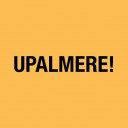
This free of charge training will be given in Dutch!
Protect your ideas and strengthen your competitive advantage with the basic Intellectual Property Rights training.
What will you learn during the training?
- Introduction to different IP rights: get a clear understanding of the IP rights that protect you.
- Real-life examples of collaboration and ownership: Learn how IP rights work in collaborations.
- Freedom to operate: discover how to preserve room to innovate without legal risks.
- The value of technical details in patent publications: Understand how these details give you an advantage in the market.
When: Monday, 9 December 2024 15.30 - 18.00
Location: Ondernemersplein Almere (cityhal Almere), Stadhuisplein 1, 1315HR Almere
Stay up to date
Get notified about new updates, opportunities or events that match your interests.

